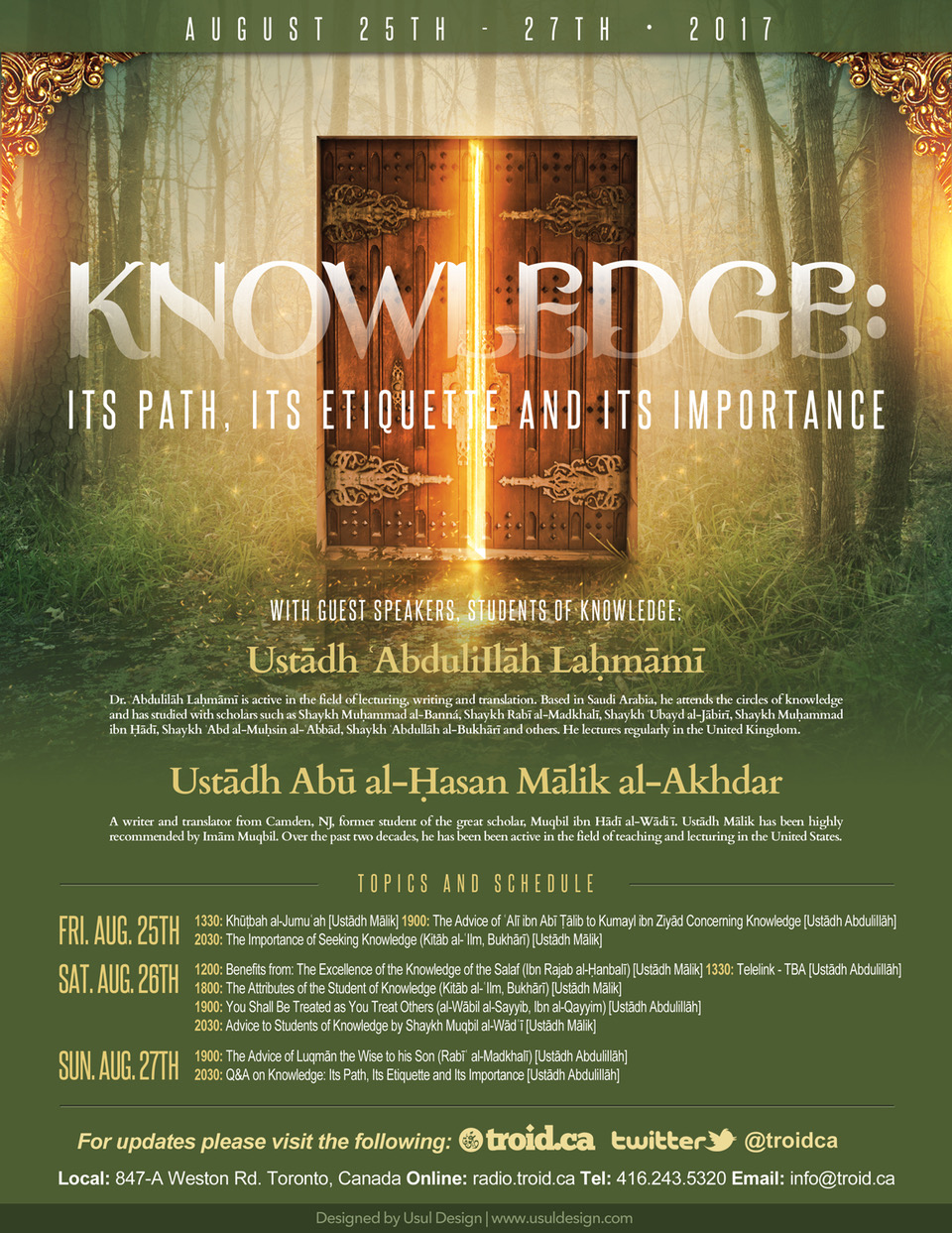- The ‘Khalaf’ are those who came after the Salaf
- There is no doubt regarding the great praise that the Prophet (ṣallallāhu ʿalayhi wa-sallam) gave to the Salaf, as can be found in the authentic narration, “The best of mankind is my generation, and then those who come after them, then those who come after them.”
- Ibn Rajab in this treatise speaks about the evil of disputing and argumentation in the religion. He begins his treatise by dividing knowledge into knowledge that benefits and knowledge which does not benefit. He also addresses the excellence and virtue of the Salaf over the Khalaf
- Regarding the Salaf, then in a narration ʿAbdullāh ibn Mubārak said regarding ʿAmr ibn Thābit, ‘Abandon his ḥadīth, for indeed he used to abuse and insult the Salaf.’
- ʿAbdullah ibn Mubārak was from the Tābiʿīn, so here when he is speaking about the Salaf, he is referring to the Companions
- This narration can be found in the Muqaddimah of Ṣaḥīḥ Muslim
- Shaykh Ṣālaḥ al-ʿUthaymīn said regarding the linguistic definition of knowledge, then it is to comprehend something according to its reality and it is the opposite of ignorance. As for the Sharʿī definition, then it is that knowledge which was revealed to the Messenger (ṣallallāhu ʿalayhi wa-sallam) by way of revelation.
- The knowledge of the Salaf has virtue and excellence over those who came after them. Shaykh al-Albāni (raḥimahullāh) mentioned regarding those who say ‘we are men and they are men’ trying to equate their knowledge with that of the knowledge of the Salaf, then the likes of this is not found in the statements of the Prophet (ṣallallāhu ʿalayhi wa-sallam).
- Allāh in the Qurʾān mentions knowledge which is praiseworthy, and it is that knowledge which is beneficial, and at other times He mentions that knowledge which is dispraised worthy, and it is the type of knowledge that does not benefit.
- Ibn Rajab constantly refers back to the Book of Allāh utilising examples with regard to the various types of knowledge.
- As for beneficial knowledge, then Allāh has mentioned,
۞ قُلۡ هَلۡ يَسۡتَوِى ٱلَّذِينَ يَعۡلَمُونَ وَٱلَّذِينَ لَا يَعۡلَمُونَۗ
“Say: Are those who know equal to those who know not?“
[Sūrah al-Zumar, 39: 9]
- This āyah indicates that those who have knowledge are superior and have greater excellence over those who are ignorance
- Allāh also says,
۞ وَقُل رَّبِّ زِدۡنِى عِلۡمً۬ا
“And say: My Lord increase me in knowledge!“
[Sūrah Ṭā Hā, 20: 114]
- Here we have Allāh commanding the Prophet (ṣallallāhu ʿalayhi wa-sallam) to seek an increase in knowledge. Ibn Hajr (raḥimahullāh) in Fat`h al-Bārī mentions: here we have Allāh commanding the Prophet to seek an increase in knowledge like nothing else.
- We should strive in supplication to Allāh for an increase in beneficial knowledge
- There is no harm in gaining knowledge of worldly affairs in order for one to benefit and feed his family, however, this knowledge of worldly affairs should not be gained at the expense of the knowledge of the Sharīʿah.
- Allāh (subḥānahu wa taʿāla) says,
۞ إِنَّمَا يَخۡشَى ٱللَّهَ مِنۡ عِبَادِهِ ٱلۡعُلَمَـٰٓؤُاْۗ
“It is only those who have knowledge among His slaves that fear Allāh.”
[Sūrah Fāṭir, 35: 28]
- Sharʿī knowledge is that which increases one in the taqwá of Allāh and increases one’s īmān strengthening his dīn, not the type of knowledge which will cause an individual’s dīn to weaken
- Ibn Rajab divides knowledge into categories; the first type of knowledge is beneficial knowledge which is knowledge of revelation, and it is this type of knowledge that one should seek to increase in and strive in supplicating to Allāh to increase us in it.
- The second type of knowledge is a knowledge that is beneficial in and of itself; Allāh mentions in the Qurʾān,
۞ مَثَلُ ٱلَّذِينَ حُمِّلُواْ ٱلتَّوۡرَٮٰةَ ثُمَّ لَمۡ يَحۡمِلُوهَا كَمَثَلِ ٱلۡحِمَارِ يَحۡمِلُ أَسۡفَارَۢاۚ
“The likeness of those who were entrusted with the (obligation of the) Taurāt (Torah) (i.e. to obey its commandments and to practise its laws), but who subsequently failed in those (obligations), is as the likeness of a donkey which carries huge burdens of books (but understands nothing from them).”
[Sūrah al-Jumuʿah, 62: 5]
- This can be found in the example of Zāhid al-Kawtharī, regarding whom Shaykh al-Albāni said he was one who possessed some knowledge of ḥadīth, however, this knowledge did not benefit him, but rather served as a proof against him; so he is like the example of the donkey who does not gain any benefit.
- You may find many who study in the Islamic Universities and they may receive beneficial knowledge, yet when they return home they teach the opposite to that which they were taught by the scholars. So they were taught beneficial knowledge but it dit not benefit them.
- Regarding the verse,
۞ أَفَرَءَيۡتَ مَنِ ٱتَّخَذَ إِلَـٰهَهُ ۥ هَوَٮٰهُ وَأَضَلَّهُ ٱللَّهُ عَلَىٰ عِلۡمٍ۬ وَخَتَمَ عَلَىٰ سَمۡعِهِۦ وَقَلۡبِهِۦ وَجَعَلَ عَلَىٰ بَصَرِهِۦ غِشَـٰوَةً۬ فَمَن يَہۡدِيهِ مِنۢ بَعۡدِ ٱللَّهِۚ أَفَلَا تَذَكَّرُونَ
“Have you seen him who takes his own lust (vain desires) as his ilāh (god)? and Allāh knowing (him as such), left him astray, and sealed his hearing and his heart, and put a cover on his sight. Who then will guide him after Allāh? Will you not then remember?“
[Sūrah al-Jāthiyah, 45: 23]
- Ibn Kathīr (raḥimahullāh) in his tafsīr mentions that there are two possible interpretations as it relates to this verse, the first: what is intended here is that this individual deserved to be misguided due to Allāh’s infinite knowledge concerning him; the second: Allāh caused him to become misguided after the knowledge was conveyed to him and the proof was established against him. This second interpretation is what Ibn Rajab interpreted the āyah to mean.
- It should be noted that just because an individual possesses something of knowledge does not necessitate that they are someone to take knowledge from.
- The Salaf would say: even if you were to see a man walking upon water, judge him in accordance to the Qurʾān and the Sunnah
- As for the type of knowledge that dispraise worthy, then an example of this is the knowledge of magic which Allāh mentions in the Qurʾān:
وَٱتَّبَعُواْ مَا تَتۡلُواْ ٱلشَّيَـٰطِينُ عَلَىٰ مُلۡكِ سُلَيۡمَـٰنَۖ وَمَا ڪَفَرَ سُلَيۡمَـٰنُ وَلَـٰكِنَّ ٱلشَّيَـٰطِينَ كَفَرُواْ
يُعَلِّمُونَ ٱلنَّاسَ ٱلسِّحۡرَ وَمَآ أُنزِلَ عَلَى ٱلۡمَلَڪَيۡنِ بِبَابِلَ هَـٰرُوتَ وَمَـٰرُوتَۚ وَمَا يُعَلِّمَانِ مِنۡ أَحَدٍ حَتَّىٰ يَقُولَآ إِنَّمَا نَحۡنُ فِتۡنَةٌ۬ فَلَا تَكۡفُرۡۖ
فَيَتَعَلَّمُونَ مِنۡهُمَا مَا يُفَرِّقُونَ بِهِۦ بَيۡنَ ٱلۡمَرۡءِ وَزَوۡجِهِۦۚ وَمَا هُم بِضَآرِّينَ بِهِۦ مِنۡ أَحَدٍ إِلَّا بِإِذۡنِ ٱللَّهِۚ
۞ وَيَتَعَلَّمُونَ مَا يَضُرُّهُمۡ وَلَا يَنفَعُهُمۡۚ وَلَقَدۡ عَلِمُواْ لَمَنِ ٱشۡتَرَٮٰهُ مَا لَهُ ۥ فِى ٱلۡأَخِرَةِ مِنۡ خَلَـٰقٍ۬ۚ وَلَبِئۡسَ مَا شَرَوۡاْ بِهِۦۤ أَنفُسَهُمۡۚ لَوۡ ڪَانُواْ يَعۡلَمُونَ
“They followed what the Shayāṭīn (devils) gave out (falsely of the magic) in the lifetime of Sulaymān (Solomon).
Sulaymān did not disbelieve, but the Shayāṭīn (devils) disbelieved, teaching men magic and such things that came down at Babylon to the two (angels,) Hārūt and Mārūt, but neither of these two angels taught anyone (such things) till they had said, “We are only for trial, so disbelieve not (by learning this magic from us).”
And from these (angels) people learn that by which they cause separation between man and his wife, but they could not thus harm anyone except by Allāh’s Leave.
And they learn that which harms them and profits them not. And indeed they knew that the buyers of it (magic) would have no share in the Hereafter.
And how bad indeed was that for which they sold their ownselves, if they but knew.“
[Sūrah al-Baqarah, 2: 102]
- “And they knew that the buyers of it (magic)…” means they were informed and warned and had knowledge regarding the severity of this affair, but they did not benefit from this knowledge. Thus beneficial knowledge can be presented to a person and it is possible they will still not benefit from it.
- We also find in the examples of knowledge that benefits and knowledge that does not benefit present within a number of supplications, from them the invocation, “O’ Allāh, I seek refuge with You from the knowledge that does not benefit, from the heart that is not fearful, from a soul that is not satisfied, and from a supplication that is not answered.”
- One can memorise chapters of Aḥādīth and yet can still oppose these narrations in his actions; in this case we find that knowledge has not benefitted this individual.














